
Bees are winged insects closely related to wasps and ants, known for their role in pollination and, in the case of the best-known bee species, the western honey bee, for producing honey. Bees are a monophyletic lineage within the superfamily Apoidea. They are presently considered a clade, called Anthophila. There are over 16,000 known species of bees in seven recognized biological families. Some species – including honey bees, bumblebees, and stingless bees – live socially in colonies while most species (>90%) – including mason bees, carpenter bees, leafcutter bees, and sweat bees – are solitary.

Hover flies, also called flower flies or syrphid flies, make up the insect family Syrphidae. As their common name suggests, they are often seen hovering or nectaring at flowers; the adults of many species feed mainly on nectar and pollen, while the larvae (maggots) eat a wide range of foods. In some species, the larvae are saprotrophs, eating decaying plant and animal matter in the soil or in ponds and streams. In other species, the larvae are insectivores and prey on aphids, thrips, and other plant-sucking insects.
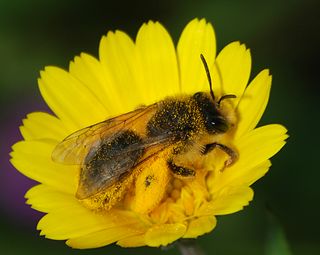
Andrena is a genus of bees in the family Andrenidae. With over 1,500 species, it is one of the largest genera of animals. It is a strongly monophyletic group that is difficult to split into more manageable divisions; currently, Andrena is organized into 104 subgenera. It is nearly worldwide in distribution, with the notable exceptions of Oceania and South America. Bees in this genus are commonly known as mining bees due to their ground-nesting lifestyle.

The Melectini are a tribe of medium- to large-sized apid bees found essentially worldwide. They are brood parasites of the related typical digger bees (Anthophorini) and occasionally visit flowers e.g. in prairie landscapes of the United States.

Mycena interrupta, commonly known as the pixie's parasol, is a species of mushroom. It has a Gondwanan distribution pattern, being found in Australia, New Zealand, New Caledonia and Chile. In Australia, it is found in Victoria, Tasmania, New South Wales, and South Australia, and in Queensland where its distribution is limited to Lamington National Park.
Stelis interrupta is a species of leafcutter, mason, and resin bees in the family Megachilidae. It is found in North America.

Brachymelecta is a genus of digger-cuckoo bees in the family Apidae, formerly known by the name Xeromelecta.

Hoplitis is a genus of bees in the family Megachilidae. There are more than 380 described species in Hoplitis.
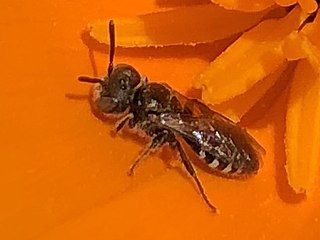
Perdita interrupta is a species of bee in the family Andrenidae. It is found in North America.
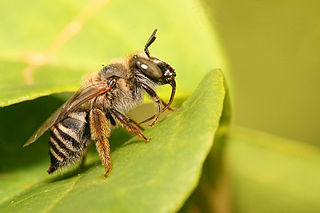
Tetraloniella is a genus of long-horned bees in the family Apidae. There are more than 100 described species in Tetraloniella with most being from North America
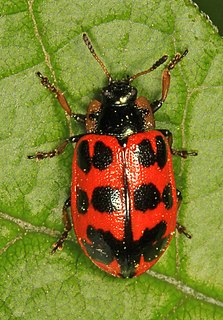
Chrysomela interrupta, the alder leaf beetle, is a species of leaf beetle in the family Chrysomelidae. It is found in North America.

Dicromantispa interrupta is a species of mantidfly in the family Mantispidae. It is found in Central America and North America.
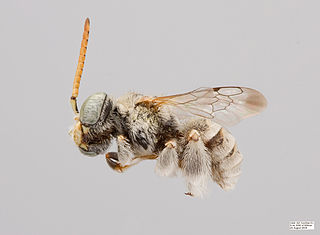
Anthophorula is a genus of bees in the family Apidae. There are more than 60 described species in Anthophorula.

Myzia interrupta, the broken-dashed ladybeetle, is a species of lady beetle in the family Coccinellidae. It is found in North America.
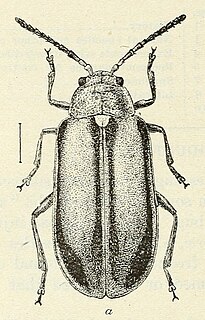
Erynephala is a genus of skeletonizing leaf beetles in the family Chrysomelidae. There are six described species in Erynephala. They are found in North America and the Neotropics.
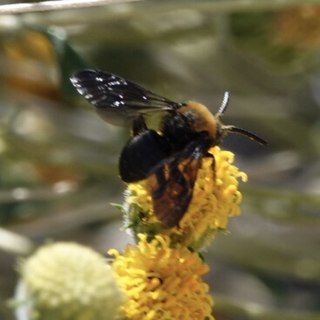
Brachymelecta larreae is a species of cuckoo bee in the family Apidae. It is found in Central America and North America.
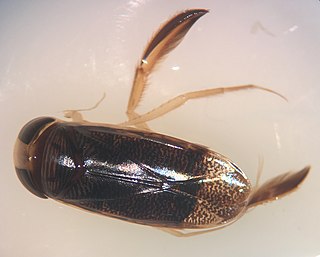
Hesperocorixa interrupta is a species of water boatman in the family Corixidae. It is found in North America.

Odontomyia interrupta is a species of soldier fly in the family Stratiomyidae.
Brachymelecta californica is a species of cuckoo bee in the family Apidae, found in Central America and North America.

Augochloropsis is a genus of brilliant metallic, often blue-green, sweat bees in the family Halictidae. There are at least 140 described species in Augochloropsis.

















